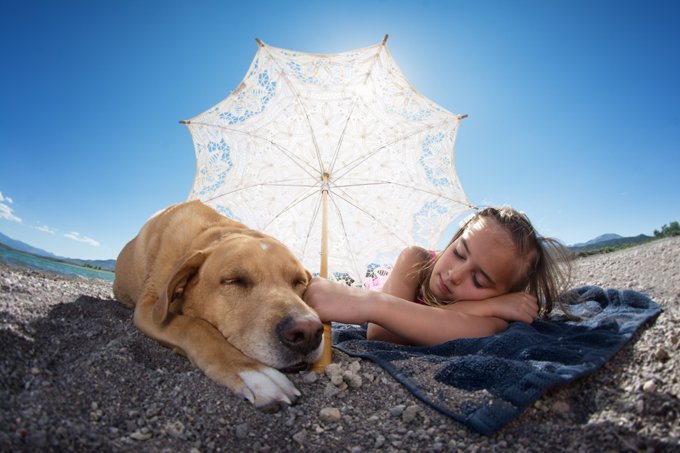Summer is here and we’re all excited to soak up the sun with our pets. Before you head out with the family’s furry friend, take a peek at these tips to help your pet thrive this season.
Keep your pet cool and hydrated
When it’s hot out, make sure your pet is off of asphalt. Asphalt temps can get extreme and burn your pet’s pads – and can cause heatstroke.
To test the heat, place your hand on the ground for at least 10 seconds. If it’s painful on your hands after 10, it’s too hot for your pet’s paws.
Mornings and cooler evenings are a good bet for walks. The hottest part of the day heats the asphalt, and our pets don’t always let us know when they’re feeling the burn.
While inside, make sure the temp is as controlled as it can be. Cooling off the house with fans and shades is important for your pets if you don’t have reliable AC.
Access to clean, cool water is a must in the summer – even when it’s nice inside. And if the water warms up a lot, refresh it with some cool water to help keep your pet’s temp in equilibrium.
If your pet is elderly, has a heart or lung disease, or has a flat face (such as Pekingese dogs or Persian cats) it can be best to keep them inside as much as possible. Breeds with flat faces can have trouble panting effectively enough to combat the heat.
These pets are more susceptible to heatstroke, which can cause vomiting, lethargy, seizures, or even death. If you think your pet is experiencing heatstroke, bring them to a veterinarian right away.

Courtesy of Getty
Common items to watch out for
Summer days are the best for barbeques and get-togethers. If you bring your pets along for the fun, make sure they can’t get a hold of all the tasty human foods and snacks. Some common summer foods that can be harmful include onions, grapes, candy, and salty foods. Try to keep your summer meals out of reach from curious pets.
If your furry friend likes to lounge on the lawn, take care to avoid rodenticides and garden insecticides. These can cause issues for your pet if they are ingested. You’ll also want to watch out for yellow jackets, bees, and snakes. If your pet is stung or bit by any critter or creature, reach out to your veterinarian immediately.
If your family pet is a lounger and likes to lay on the lawn, or loves to play on the lawn, be careful about what you use on the grass. Take special care to avoid pesticides and garden insecticides, and instead opt for organic or nontoxic options that are readily available.
Visit your veterinarian for a summer wellness appointment
Start the summer right with an appointment with your veterinarian. You can get your pets tested for heartworm and put them on a year-round preventative if you haven’t already. With more time spent outside, it’s important to keep your pet protected against fleas and ticks.
While you’re there, ask about the best skin protection product for your pet. Pets with pink skin or a light coat might be vulnerable to sunburns. Your vet can help you choose a safe sunscreen option for your cat or dog.
It’s also a good idea to keep your pet’s long fur trimmed back a bit during the hotter months. But don’t shave your pets too short— their coats actually offer protection from overheating and sunburns.
There are things to look out for when it comes to your pets in the summer. But with some knowledge and precautions, you can help them live their best life.




